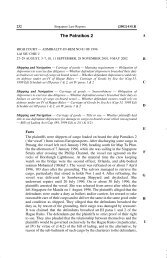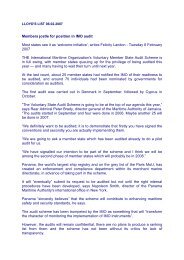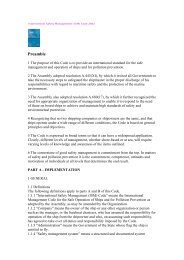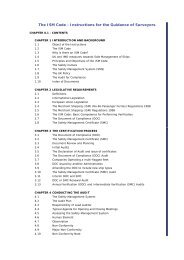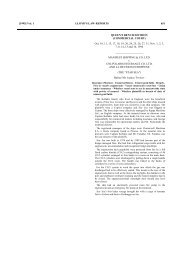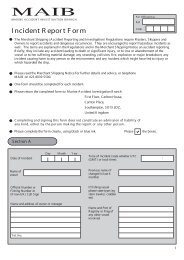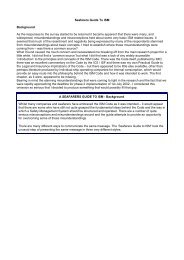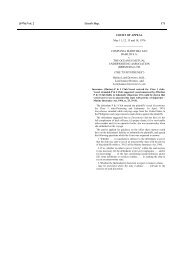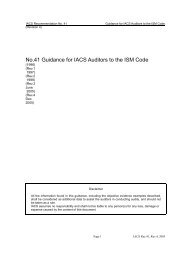Background to the Research - ISM Code
Background to the Research - ISM Code
Background to the Research - ISM Code
Create successful ePaper yourself
Turn your PDF publications into a flip-book with our unique Google optimized e-Paper software.
<strong>Background</strong> <strong>to</strong> <strong>the</strong> research<br />
The <strong>ISM</strong> <strong>Code</strong> had been developed as a reaction <strong>to</strong> an alarming escalation of accidents and claims during <strong>the</strong><br />
1980’s – many of which were high profile and were <strong>the</strong> subject of concern by <strong>the</strong> general public as well as <strong>the</strong><br />
shipping and insurance industries. The purpose of <strong>the</strong> <strong>Code</strong> was <strong>to</strong> make ships safer and seas cleaner.<br />
Human fac<strong>to</strong>rs had been identified as <strong>the</strong> major problem. Almost all ships and ship operating companies<br />
around <strong>the</strong> world had <strong>to</strong> comply with <strong>the</strong> <strong>ISM</strong> <strong>Code</strong> and had <strong>to</strong> be certified <strong>to</strong> prove that <strong>the</strong>y were compliant –<br />
if <strong>the</strong>y did not <strong>the</strong>n <strong>the</strong>y could not trade.<br />
Introduction<br />
In July 1998 almost all maritime nations around <strong>the</strong> world implemented a major change in <strong>the</strong>ir domestic law,<br />
with <strong>the</strong> intention of making ships safer and seas cleaner. Through a process of tacit acceptance, all members<br />
of <strong>the</strong> maritime section of <strong>the</strong> United Nations – <strong>the</strong> International Maritime Organisation (IMO) - had agreed <strong>to</strong><br />
amend <strong>the</strong> Safety of Life at Sea Convention 1974 (SOLAS ’74) <strong>to</strong> incorporate a new chapter IX - <strong>the</strong><br />
‘International Management <strong>Code</strong> for <strong>the</strong> Safety of Ships and for Pollution Prevention’ – <strong>the</strong> <strong>ISM</strong> <strong>Code</strong>. Most<br />
people involved in shipping, maritime law and marine insurance consider <strong>the</strong> <strong>ISM</strong> <strong>Code</strong> <strong>to</strong> be amongst <strong>the</strong><br />
most significant and important pieces of international maritime legislation ever promulgated.<br />
The <strong>ISM</strong> <strong>Code</strong> is a brief set of general guidelines describing what shipowners must undertake in order <strong>to</strong><br />
implement a safety management system both on board <strong>the</strong>ir ships and in <strong>the</strong>ir organisations ashore. The<br />
need <strong>to</strong> legislate had arisen as a result of a general decline in safety standards on board ships during <strong>the</strong> late<br />
1980’s and early 1990’s as well as a reaction <strong>to</strong> a number of major incidents such as <strong>the</strong> capsize and loss of<br />
life of <strong>the</strong> passenger ferry Herald of Free Enterprise in 1987, <strong>the</strong> catastrophic oil pollution from <strong>the</strong> super<br />
tanker Exxon Valdez off <strong>the</strong> coast of Alaska in 1989 spilling 37,000 <strong>to</strong>nnes of oil, <strong>the</strong> fire which swept through<br />
<strong>the</strong> cruise ship Scandinavian Star in 1990 with extensive loss of life, <strong>the</strong> laden tanker Braer which was driven<br />
on<strong>to</strong> Shetland Islands in 1993 with widespread pollution, <strong>the</strong> sinking of ano<strong>the</strong>r passenger ferry Es<strong>to</strong>nia in <strong>the</strong><br />
Baltic Sea in 1994 with enormous loss of life and yet a fur<strong>the</strong>r major oil spill from <strong>the</strong> Sea Empress in Milford<br />
Haven in 1996.<br />
Various investigations had been undertaken and reports issued attempting <strong>to</strong> explain <strong>the</strong> reasons behind <strong>the</strong><br />
problems. Each report concluded that <strong>the</strong> main, underlying reason, for all <strong>the</strong> accidents and incidents was<br />
‘human error’ in one form or ano<strong>the</strong>r. Led by <strong>the</strong> British delegation, representatives of <strong>the</strong> world maritime<br />
nations met at <strong>the</strong> IMO and decided that if <strong>the</strong> maritime industry had lost <strong>the</strong> ability <strong>to</strong> self regulate on issues<br />
of safety and pollution prevention <strong>the</strong>n legislation would be necessary <strong>to</strong> regulate <strong>the</strong> industry. The approach<br />
taken was <strong>to</strong> promote <strong>the</strong> idea of developing safety management systems (SMS) which would address directly<br />
<strong>the</strong> human error problem. The legislation would also require <strong>the</strong> flag state of each vessel <strong>to</strong> officially approve<br />
<strong>the</strong> SMS of each ship opera<strong>to</strong>r and <strong>the</strong> system on board each vessel and issue certificates confirming<br />
compliance. Without those certificates <strong>the</strong> vessels would not be allowed <strong>to</strong> trade and would loose <strong>the</strong>ir<br />
insurances.<br />
Concurrently with <strong>the</strong> work being undertaken at IMO, developing <strong>the</strong> structure of <strong>the</strong> <strong>ISM</strong> <strong>Code</strong>, I was involved<br />
in <strong>the</strong> shipping and marine insurance industries in also looking at ways of overcoming <strong>the</strong> human error<br />
problem. This <strong>to</strong>ok <strong>the</strong> form of developing a whole range of education and training courses, books, videos,<br />
posters and a range of o<strong>the</strong>r <strong>to</strong>ols which ship opera<strong>to</strong>rs could use in <strong>the</strong>ir own accident and loss prevention<br />
programs. At that time <strong>the</strong> work I was doing was unique within <strong>the</strong> marine insurance industries and attracted<br />
considerable attention from <strong>the</strong> edi<strong>to</strong>rs and journalists of shipping newspapers and magazines who were<br />
eager <strong>to</strong> promote and encourage that initiative. I was invited <strong>to</strong> speak at many seminars and conferences and<br />
myself personally, and my employers - <strong>the</strong> North of England P&I Club - were held out <strong>to</strong> be <strong>the</strong> market leaders<br />
in loss prevention – an accolade which is still generally bes<strong>to</strong>wed upon us.<br />
Controversy develops ahead of <strong>ISM</strong> implementation<br />
As <strong>the</strong> final implementation date of <strong>the</strong> <strong>ISM</strong> <strong>Code</strong> - 1st July 1998 - started <strong>to</strong> appear on <strong>the</strong> horizon a<br />
commentary on <strong>the</strong> <strong>Code</strong> was published by <strong>the</strong> International Chamber of Shipping and <strong>the</strong> International<br />
Shipping Federation providing a brief, but point by point, guideline of what <strong>the</strong>y unders<strong>to</strong>od <strong>to</strong> be <strong>the</strong> practical<br />
requirements of <strong>the</strong> <strong>Code</strong>. A number of articles also started <strong>to</strong> appear in various journals around <strong>the</strong> world,<br />
mainly written by lawyers, drawing attention <strong>to</strong> a number of potential legal problems which <strong>the</strong>y could see<br />
arising directly from <strong>the</strong> implementation of <strong>the</strong> <strong>Code</strong> by ship opera<strong>to</strong>rs. Indeed quite a debate developed on<br />
<strong>the</strong>se issues and I was inevitably drawn in <strong>to</strong> that debate. I was often quoted, had a number of articles<br />
published both in shipping and legal journals and was invited <strong>to</strong> speak at many international seminar and<br />
conferences relating <strong>to</strong> <strong>the</strong> <strong>ISM</strong> <strong>Code</strong>.<br />
Possibly <strong>the</strong> worlds leading publisher of books on maritime related subjects – Lloyds of London Press (LLP)<br />
recognised that <strong>the</strong>re would be a need for an authoritative guide <strong>to</strong> <strong>the</strong> <strong>ISM</strong> <strong>Code</strong> and, in particular, <strong>the</strong> legal<br />
and insurance implications of <strong>the</strong> <strong>Code</strong>. Bearing in mind that almost every ship and every shipowner in <strong>the</strong><br />
world would have <strong>to</strong> comply with <strong>the</strong> requirements of <strong>the</strong> <strong>Code</strong> <strong>the</strong> publishers no-doubt perceived an<br />
enormous potential market for such a book. At that time, and even now – two years after <strong>the</strong> initial
implementation date, no o<strong>the</strong>r commercial publisher, anywhere in <strong>the</strong> world – as far as I know - has attempted<br />
<strong>to</strong> publish a book on this most important and controversial aspect of <strong>the</strong> <strong>Code</strong>.<br />
LLP approached me in 1997 <strong>to</strong> ask whe<strong>the</strong>r I would be prepared <strong>to</strong> accept a commission <strong>to</strong> write <strong>the</strong> book.<br />
Whilst being very flattered <strong>to</strong> be asked, my initial reaction was <strong>to</strong> decline since this would carry with it an<br />
enormous responsibility and what was being proposed was very much a ‘legal’ subject and I was not a<br />
qualified lawyer. Some of <strong>the</strong> legal issues involved, which had become <strong>the</strong> subject of such considerable<br />
debate in <strong>the</strong> journals, involved extremely complex legal issues upon which leading academic and<br />
professional lawyers could not agree. However, upon reflection, I recalled <strong>the</strong> whole rationale and philosophy<br />
behind <strong>the</strong> first book I had been involved with – ‘The Masters Role in Collecting Evidence’ when I <strong>to</strong>ok ano<strong>the</strong>r<br />
legal <strong>to</strong>pic – <strong>the</strong> collection of evidence for use in dealing with claims or subsequent litigation – and presented<br />
guidance in understandable terms for <strong>the</strong> ships masters and officers. It occurred <strong>to</strong> me that what was required<br />
was a guide <strong>to</strong> <strong>the</strong> insurance and legal implications of <strong>the</strong> <strong>Code</strong> – not written as a legal text book for lawyers<br />
but ra<strong>the</strong>r as an understandable guide for non-lawyers directly involved in <strong>the</strong> practical job of actual<br />
implementation of <strong>the</strong> <strong>Code</strong> – this would include not only <strong>the</strong> management and staff of <strong>the</strong> ship opera<strong>to</strong>rs<br />
office ashore and <strong>the</strong> Master and officers on board ship – but also a whole range of o<strong>the</strong>rs in <strong>the</strong> shipping,<br />
marine insurance and o<strong>the</strong>r related industries around <strong>the</strong> world.<br />
LLP liked <strong>the</strong> idea and it was agreed that I would accept <strong>the</strong> commission and that <strong>the</strong> book would be<br />
published in <strong>the</strong>ir ‘Practical Guide’ series ra<strong>the</strong>r than <strong>the</strong>ir ‘Maritime Law’ series.<br />
A Practical Guide <strong>to</strong> <strong>the</strong> Legal and Insurance Implications of <strong>the</strong> <strong>ISM</strong> <strong>Code</strong><br />
The plan had been <strong>to</strong> publish ahead of 1st July 1998 implementation date. However, <strong>the</strong> manuscript <strong>to</strong>ok<br />
longer <strong>to</strong> prepare than had been originally anticipated. There were a number of reasons for this but primarily I<br />
was waiting for sight of <strong>the</strong> final draft of <strong>the</strong> White Paper which would be used <strong>to</strong> enact <strong>the</strong> <strong>ISM</strong> <strong>Code</strong> in<strong>to</strong><br />
English domestic law. The final text of <strong>the</strong> <strong>ISM</strong> <strong>Code</strong> had been agreed by <strong>the</strong> IMO and had been widely<br />
disseminated and I had assumed that <strong>the</strong> White Paper would merely implement <strong>the</strong> <strong>Code</strong> seriatim as Chapter<br />
IX of SOLAS 74. Although dated 1st July 1998 – <strong>the</strong> white paper did not pass through Parliament until a few<br />
days later. When I saw what was contained in <strong>the</strong> Act I was quite staggered and had <strong>to</strong> return <strong>to</strong> <strong>the</strong> drawing<br />
board and rewrite a number of sections. What was so staggering was that law would now impose criminal<br />
sanctions against anyone who did not comply with <strong>the</strong> implementation of <strong>the</strong> <strong>Code</strong> and <strong>the</strong> SMS. I do not<br />
believe this had ever been anticipated by <strong>the</strong> original draftsmen of <strong>the</strong> <strong>Code</strong> nor had it figured as a possibility<br />
in <strong>the</strong> debates leading up <strong>to</strong> implementation. Indeed I still believe that <strong>the</strong> idea of criminal sanctions is quite<br />
contrary <strong>to</strong> <strong>the</strong> very spirit and philosophy of <strong>the</strong> <strong>Code</strong> which anticipates moving away from a blame and<br />
punishment culture in<strong>to</strong> a culture of safety, continuous improvement and <strong>the</strong> adoption of personal<br />
responsibility for ones own safety and <strong>the</strong> safety of o<strong>the</strong>rs.<br />
The rewriting and restructuring meant that <strong>the</strong> final manuscript was not available until November 1998. The<br />
Secretary General of IMO - Mr. William A. O’Neil - very kindly provided a foreword. The book was published in<br />
December 1998 and was well received by <strong>the</strong> industry. Copies sold quickly and LLP had <strong>to</strong> go <strong>to</strong> a second<br />
print run by February 1999. I was advised by <strong>the</strong>m that this was <strong>the</strong> fastest selling book <strong>the</strong>y had ever<br />
published.<br />
<strong>Research</strong> behind <strong>the</strong> book<br />
My primary source of reference was <strong>the</strong> text of <strong>the</strong> <strong>ISM</strong> <strong>Code</strong> itself. The text had been formally adopted at <strong>the</strong><br />
18th session of <strong>the</strong> IMO Assembly on 4th November 1993. The <strong>Code</strong> itself was published by <strong>the</strong> IMO in an A5<br />
size booklet - comprising of 13 brief articles set out on less than ten pages.<br />
My main secondary sources of reference were:<br />
• IMO Resolution A.788(19) adopted 23 November 1995 - ‘Guidelines on Implimentation of <strong>the</strong><br />
International Safety Management (<strong>ISM</strong>) <strong>Code</strong> by Administrations’<br />
• ‘Guidelines on <strong>the</strong> application of <strong>the</strong> IMO International Safety Management (<strong>ISM</strong>) <strong>Code</strong>’ - Published<br />
by <strong>the</strong> International Chamber of Shipping (ICS) and <strong>the</strong> International Shipping Federation (ISF).<br />
• A wide range of articles and published papers from around <strong>the</strong> world which I had collected from<br />
various sources in which academic and professional lawyers set out <strong>the</strong>ir views on some of <strong>the</strong><br />
potential legal and insurance implications of <strong>the</strong> <strong>ISM</strong> <strong>Code</strong>.<br />
• Subsequently, Statu<strong>to</strong>ry Instrument 1998 No. 1561 - The Merchant Shipping (International Safety<br />
Management (<strong>ISM</strong>) <strong>Code</strong>) Regulations 1998.<br />
In addition <strong>to</strong> <strong>the</strong>se secondary reference sources I also embarked upon extensive legal research in<strong>to</strong> a<br />
significant number of reported court cases which addressed maritime safety and o<strong>the</strong>r issues which were<br />
starting <strong>to</strong> appear as being relevant <strong>to</strong> <strong>the</strong> <strong>ISM</strong> <strong>Code</strong>.
I also engaged in extensive discussions with individuals and organisations within <strong>the</strong> shipping and marine<br />
insurance industries as well as <strong>the</strong> legal profession.<br />
Planning <strong>the</strong> research<br />
The international shipping industry had never previously experienced anything quite like <strong>the</strong> <strong>ISM</strong> <strong>Code</strong>. The<br />
nearest experience was probably <strong>the</strong> development and adoption by some of <strong>the</strong> larger ship management<br />
companies and ‘Oil Majors’ of Quality Assurance (QA), Quality Management (QM) and Total Quality<br />
Management (TQM) Systems during <strong>the</strong> 1990’s.. Many of <strong>the</strong> QA type systems included safety related, and<br />
pollution prevention issues. One of <strong>the</strong> most significant differences though was <strong>the</strong> fact that <strong>the</strong> QA systems<br />
were voluntary and <strong>the</strong> <strong>ISM</strong> <strong>Code</strong> was <strong>to</strong> be manda<strong>to</strong>ry. I decided that one of my initial tasks was <strong>to</strong> look at<br />
some of <strong>the</strong> QA type systems which had been set up and <strong>to</strong> discuss with <strong>the</strong> individuals involved in <strong>the</strong><br />
implementation how <strong>the</strong> systems operated, problems which had been experienced, benefits which had been<br />
experienced and problems which <strong>the</strong>y could envisage - particularly problems of a legal and insurance nature.<br />
The external audi<strong>to</strong>rs who had developed skills and were offering <strong>the</strong>ir services <strong>to</strong> <strong>the</strong> shipping industry as<br />
accrediting bodies for <strong>the</strong> QA type systems were <strong>the</strong> Classification Societies. This was a strange phenomena<br />
because many in <strong>the</strong> industry lay <strong>the</strong> blame for <strong>the</strong> decline in <strong>the</strong> standards of shipping, at least partially, at<br />
<strong>the</strong> feet of <strong>the</strong> Classification Societies. The Classification Societies, such as Lloyds Register, had been<br />
established well over a hundred years ago <strong>to</strong> inspect and moni<strong>to</strong>r <strong>the</strong> condition of merchant ships and<br />
basically <strong>to</strong> confirm <strong>to</strong> <strong>the</strong> Underwriters that <strong>the</strong> ships were being maintained in a good seaworthy condition<br />
and thus a good insurance risk. In order <strong>to</strong> better understand <strong>the</strong> role of <strong>the</strong> Audi<strong>to</strong>r and indeed <strong>to</strong> understand<br />
how ‘management systems’ worked I enrolled on a one week intensive training course at Southamp<strong>to</strong>n<br />
University - Warsash Maritime Centre <strong>to</strong> qualify as a Maritime Assessor / Lead Assessor for both ISO QA type<br />
systems and also <strong>the</strong> <strong>ISM</strong> <strong>Code</strong> Safety Management Systems. With this practical knowledge I was <strong>the</strong>n better<br />
equiped <strong>to</strong> enter in<strong>to</strong> debate with <strong>the</strong> Classification Societies and understand what <strong>the</strong>y had been doing. Not<br />
only were <strong>the</strong> Societies offering <strong>the</strong>ir services <strong>to</strong> <strong>the</strong> industry <strong>to</strong> help Shipowners devise and implement <strong>the</strong>ir<br />
Safety Management Systems but were also being commissioned by <strong>the</strong> Governments of many of <strong>the</strong> maritime<br />
nations (as flag states) <strong>to</strong> issue <strong>the</strong> <strong>ISM</strong> Certification on <strong>the</strong>ir behalf. There seemed <strong>to</strong> me <strong>to</strong> be a potentially<br />
serious conflict of interest situation in that dual role but it became clear that <strong>the</strong>y would continue regardless.<br />
However, <strong>the</strong> point was that <strong>the</strong> Societies, more than anyone else in <strong>the</strong> industry, could provide me with <strong>the</strong><br />
most up-<strong>to</strong>-date thinking on <strong>the</strong> interpretation and implementation of <strong>the</strong> <strong>Code</strong>. I <strong>the</strong>refore engaged in<br />
extensive discussions with a number of <strong>the</strong> Societies <strong>to</strong> deepen my general grounding. I also entered in<strong>to</strong><br />
dialogue with <strong>the</strong> International Chamber of Shipping (ICS) and <strong>the</strong> International Shipping Federation (ISF)<br />
who had published <strong>the</strong> definitive commentary on <strong>the</strong> <strong>Code</strong> and in particular with <strong>the</strong> authors of that<br />
commentary.<br />
Whilst discussions with <strong>the</strong> Societies and <strong>the</strong> ICS / ISF were very useful and interesting <strong>the</strong>y both made it<br />
quite clear that <strong>the</strong>y had not given much attention <strong>to</strong> <strong>the</strong> potential legal and insurance implications of <strong>the</strong> <strong>Code</strong><br />
but ra<strong>the</strong>r had concentrated on <strong>the</strong> practical issues of actually constructing and implementing <strong>the</strong> SMS. What<br />
<strong>the</strong>y gave me, however, in <strong>the</strong> absence of any empirical experience or evidence, was some flesh <strong>to</strong> put upon<br />
<strong>the</strong> bare bones of <strong>the</strong> <strong>Code</strong> itself - even though it was of a subjective nature.<br />
From <strong>the</strong> position of having analysed <strong>the</strong> <strong>Code</strong> itself from <strong>the</strong> existing and available knowledge - I <strong>the</strong>n set<br />
about analysing <strong>the</strong> legal debates which had developed in <strong>the</strong> shipping press and journals. I cannot recall now<br />
whe<strong>the</strong>r I ever believed I would find answers and solutions <strong>to</strong> <strong>the</strong> issues being debated but I was soon <strong>to</strong><br />
conclude that I would have <strong>to</strong> leave a number of questions unanswered. Arguments were being put forward by<br />
both academic as well as professional, practicing, layers and each side of <strong>the</strong> arguments carried considerable<br />
force and credulity. In <strong>the</strong> end I decided that in <strong>the</strong> book I would set out and explain each side of <strong>the</strong> argument<br />
and its significance and, where appropriate, put forward my own views. Although frustrating I had <strong>to</strong> concede<br />
that we must wait for <strong>the</strong> courts and arbitration tribunals <strong>to</strong> interpret <strong>the</strong> <strong>Code</strong> in specific cases <strong>to</strong> settle <strong>the</strong><br />
disputes.<br />
A typical example of <strong>the</strong> sort of issues being debated involved Section 4 of <strong>the</strong> <strong>Code</strong> and <strong>the</strong> implications of<br />
<strong>the</strong> role of an individual called <strong>the</strong> Designated Person (DP) who was <strong>to</strong> ‘…provide a link between <strong>the</strong> company<br />
and those on board (ship) … having direct access <strong>to</strong> <strong>the</strong> highest levels of management…’ The significance<br />
was that if it could be demonstrated that a Shipowner actually knew about a particular state of affairs, for<br />
example some unseaworthiness of his ship, and an incident occurred <strong>the</strong>n he would lose his legal right <strong>to</strong> limit<br />
his financial liability and his insurance cover would be void - it is an issue of fault and privity. Provided <strong>the</strong><br />
Shipowner could argue that he was unaware of <strong>the</strong> unseaworthiness <strong>the</strong>n he would be safe. However, <strong>the</strong><br />
situation post <strong>ISM</strong> was that <strong>the</strong> DP should be aware of most deficiencies and problems being reported from<br />
<strong>the</strong> ships as a part of <strong>the</strong> working SMS - since <strong>the</strong> DP has this direct access <strong>to</strong> <strong>the</strong> highest levels of<br />
management <strong>the</strong>n, some argue, <strong>the</strong> knowledge of <strong>the</strong> DP should be implied <strong>to</strong> be <strong>the</strong> knowledge of <strong>the</strong><br />
Shipowner or alter-ego of <strong>the</strong> company. The potential consequences for <strong>the</strong> Shipowner are very serious<br />
indeed.<br />
Preparing <strong>the</strong> manuscript
The conclusions I reached were <strong>to</strong> a large extent subjective and speculative and sometimes inconclusive.<br />
Indeed <strong>the</strong>re is an emphasis throughout <strong>the</strong> book that <strong>the</strong>re are many questions still awaiting a satisfac<strong>to</strong>ry<br />
answer. What I found satisfying in some respects but disconcerting in o<strong>the</strong>rs was comments from a number of<br />
people, including those who had been involved in <strong>the</strong> legal debates, <strong>to</strong> <strong>the</strong> effect that <strong>the</strong>y were grateful<br />
someone had <strong>the</strong> courage <strong>to</strong> take this step in<strong>to</strong> <strong>the</strong> unknown. It seemed <strong>to</strong> be <strong>the</strong> case of ‘…ra<strong>the</strong>r me than<br />
<strong>the</strong>m!!…’<br />
I set out my conclusions in <strong>the</strong> book by firstly describing <strong>the</strong> underlying philosophy of <strong>the</strong> <strong>Code</strong> and identifying<br />
<strong>the</strong> key issues. I <strong>the</strong>n described <strong>the</strong> key players in <strong>the</strong> implementation of <strong>the</strong> SMS and described <strong>the</strong>ir<br />
respective legal roles and responsibilities. The middle section of <strong>the</strong> book explored a range of shipboard<br />
related incidents, such as collisions, pollution, personal injuries etc. and considered each from <strong>the</strong> perspective<br />
of <strong>the</strong> <strong>Code</strong> and <strong>the</strong> relevant legal and insurance implications. Because <strong>the</strong>re was no empirical data on how<br />
<strong>the</strong> <strong>Code</strong> would actually be applied or interpreted I introduced in<strong>to</strong> <strong>the</strong> book a series of detailed case studies<br />
on well reported legal cases. In each case I explored actual issues of that case and <strong>the</strong>n speculated what<br />
effect <strong>the</strong> <strong>ISM</strong> <strong>Code</strong> might have had, had it been in place at <strong>the</strong> time of <strong>the</strong> particular incident. This approach<br />
allowed me <strong>to</strong> suggest ways in which <strong>the</strong> procedures of <strong>the</strong> SMS would have acted as a safeguard and should<br />
have prevented <strong>the</strong> incident occurring in <strong>the</strong> first place. I would <strong>the</strong>n consider, even if <strong>the</strong> incident did still<br />
occur, what evidence should have been available from <strong>the</strong> documentation created from within <strong>the</strong> working<br />
SMS which would come <strong>to</strong> <strong>the</strong> assistance of <strong>the</strong> Shipowner or would condemn him - depending whe<strong>the</strong>r or not<br />
he had properly implemented <strong>the</strong> SMS. The legal position of individuals was also explored. In this way I was<br />
able <strong>to</strong> bring alive <strong>the</strong> legal and insurance implications of <strong>the</strong> <strong>Code</strong> in a way in which people in <strong>the</strong> industry<br />
could relate and understand.<br />
Unanswered questions<br />
At <strong>the</strong> time of commencing <strong>the</strong> research it had been over two years since <strong>the</strong> implementation of <strong>the</strong> first phase<br />
of <strong>the</strong> <strong>ISM</strong> <strong>Code</strong> - which applied <strong>to</strong> Passenger Ships, Ferries, Bulk Carriers, Oil Tankers and Gas Tankers.<br />
The final deadline for <strong>the</strong> second phase making <strong>the</strong> requirements of <strong>the</strong> <strong>Code</strong> manda<strong>to</strong>ry for all o<strong>the</strong>r<br />
merchant vessels was set at 1st July 2002 and was looming on <strong>the</strong> horizon. Opinions on <strong>the</strong> success, or<br />
o<strong>the</strong>rwise, of <strong>the</strong> first phase are mixed. Some companies were claiming that <strong>the</strong>y had experienced significant<br />
reductions in accidents and claims many more claimed that <strong>the</strong> <strong>ISM</strong> <strong>Code</strong> was a failure and nothing more than<br />
an additional burden. Incidents such as <strong>the</strong> sinking and major pollution from <strong>the</strong> tanker Erika earlier that year<br />
may appeared <strong>to</strong> have been self evident. Having discussed <strong>the</strong> matter with individuals both seagoing and<br />
shore based it appeared that few were even prepared <strong>to</strong> try and implement <strong>the</strong> SMS because of fear of <strong>the</strong><br />
issues I had highlighted in my book - in particular <strong>the</strong> creation of documentary evidence which people fear<br />
would be used against <strong>the</strong>m personally or against <strong>the</strong> company.<br />
The time had come <strong>to</strong> establish <strong>to</strong> what extent that fear really did exist. If it did exist <strong>the</strong>n <strong>the</strong>re was a need <strong>to</strong><br />
consider <strong>the</strong> implications on <strong>the</strong> working of <strong>the</strong> SMS. If it did go <strong>to</strong> <strong>the</strong> root of <strong>the</strong> SMS <strong>the</strong>n it would be<br />
necessary <strong>to</strong> consider why <strong>the</strong> fear exists and whe<strong>the</strong>r <strong>the</strong> <strong>ISM</strong> <strong>Code</strong> can survive. If radical changes were<br />
necessary for <strong>the</strong> survival of <strong>the</strong> <strong>Code</strong> - what form would <strong>the</strong>se changes need <strong>to</strong> take: changes in <strong>the</strong> law or<br />
changes in <strong>the</strong> working culture or both That is <strong>the</strong> challenge on which I based my D.Prof. research.



